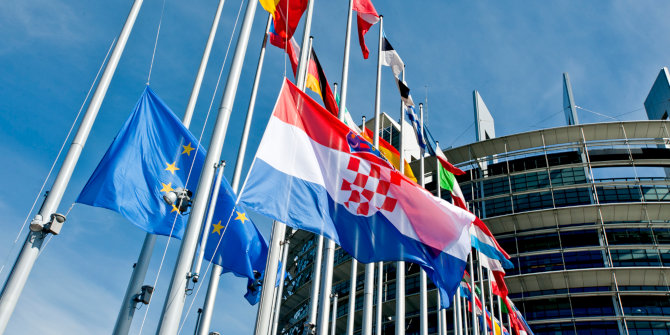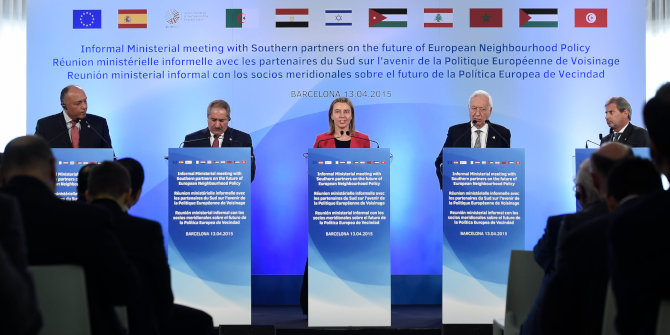 The idea that European Union accession can serve as a catalyst for conflict resolution has been generally accepted by scholars and practitioners alike. However, can conflict resolution processes that began with the prospect of eventual EU accession survive when the hope of membership dims? James Ker Lindsay argues that given that the enlargement agenda has taken a back seat to the ongoing economic crisis in Europe, this has become an increasingly relevant question. But as the relationship between Greece and Turkey shows, while the EU may help to start a process of peace building, it might not always be required to keep it going.
The idea that European Union accession can serve as a catalyst for conflict resolution has been generally accepted by scholars and practitioners alike. However, can conflict resolution processes that began with the prospect of eventual EU accession survive when the hope of membership dims? James Ker Lindsay argues that given that the enlargement agenda has taken a back seat to the ongoing economic crisis in Europe, this has become an increasingly relevant question. But as the relationship between Greece and Turkey shows, while the EU may help to start a process of peace building, it might not always be required to keep it going.
Outsiders often like to see the relationship between Greece and Turkey as some sort of primordial conflict, as if somehow the Greeks and Turks are eternal enemies. This is nonsense. Leaving aside the fact that such deterministic views of interstate relations have been debunked by the modern history of Europe – sixty years ago, many observers would have claimed that France and Germany were destined to live in a state of perpetual conflict – this argument also ignores the fact that there have in fact been periods when the countries have enjoyed remarkably cordial relations. For instance, in the late 1920s, under the leadership of Ataturk and Eleftherios Venizelos, the two countries forged a close partnership that lasted until the mid-1950s, when tensions over the island of Cyprus led to a deterioration in relations. For thirty years, the two countries coexisted and cooperated very closely.
Admittedly, since then, relations between the two countries have been largely marred by tensions and occasional crises. As well as Cyprus, the two remain at loggerheads over a number of territorial issues centred on the Aegean Sea and minority issues. Nevertheless, even during this period there have been a number of occasions when the two countries have tried to mend fences. In the early 1960s, the two tried hard to repair the damage done by Cyprus. Short-lived attempts were also made to improve relations in the late 1970s and 1980s.
The most recent initiative was launched in 1999 following a major crisis sparked by revelations that the Greek government had harboured Abdullah Ocalan, the leader of the Kurdish Workers’ Party (PKK), at its embassy in Kenya. At the time, few held out much hope that the new process of dialogue established by the then foreign ministers of Greece and Turkey, George Papandreou and Ismail Cem, would result in any real change.
However, there was a vital new element this time round. In a radical departure from its previous policy, Greece abandoned its longstanding efforts to link improvements in bilateral relations to Turkey’s EU accession process. Rather than block Turkey’s EU integration until Ankara offered concessions on key issues, Athens now promoted Turkey’s EU perspective – believing that a European Turkey would be a peaceful and cooperative neighbour. The decision to grant Turkey candidate status at the December 1999 Helsinki European Council opened the way for a dramatic improvement in political, economic and cultural contacts between the two countries in the years that followed. But as Turkey’s accession process has stalled over the past few years, many have come to question whether this process of rapprochement, which seemed to be so intimately bound to Ankara’s quest for EU membership, is sustainable in the long term.
On the one hand, it is very easy to take a dim view of the situation. There is certainly an extensive range of problems blighting bilateral relations. Both governments have insisted that a full normalisation of relations can only be achieved by resolving the outstanding Aegean disputes. These include disputes over the continental shelf, territorial waters and airspace and the demilitarisation of certain islands. There are also minority issues. Then there is Cyprus. This presents substantial problems in its own right. Whereas the Aegean is a strictly bilateral issue, and can therefore be solved by the two governments in a mutually acceptable manner, the Cyprus issue is primarily shaped by the decisions made by political leaders on the island. Athens cannot impose a solution on the Greek Cypriots, just as Ankara, contrary to the belief of many Greek and Greek Cypriots, cannot force a settlement on the Turkish Cypriots.
Despite the fact that these core problems have not been solved, there are nevertheless grounds for optimism that the process of rapprochement will continue. For a start, while the decision to grant Turkey candidacy played a crucial role in the process of détente, it was not the only factor. The peace building initiative that started in 1999 was also based on the realisation in both Ankara and Athens that the two countries had mutual concerns over a wide range of economic, political, social, environmental and security issues; ranging from the promotion of tourism to efforts to tackle organised crime and terrorism.
This rationale remains, and is still considered important. Even as Turkey’s quest for EU membership has run into difficulties, there continues to be clear evidence that the two countries want to work with one another. For example, in May 2010, the Turkish Prime Minister, Recep Tayyip Erdogan, paid an historic visit to Athens where the two governments signed a raft of new agreements, including the establishment of a High-Level Cooperation Council designed to further cement the dialogue between the two countries. Even in the past few days, it has been announced that the two governments have reached an agreement over the return of stolen artefacts. Obviously, this is a significant issue for both countries.
Of course, this is not to say that the relationship will not have its ups and downs. Even now, there are times when the two capitals adopt a tough line towards each other. A recent example is the criticism voiced by the Greek foreign minister over Turkey’s boycott of the Cyprus EU presidency, in which he accused Ankara of having insulted the EU by its attitudes to such a key institution. There may even be occasional crises. There are still far too many occasions when Turkish military overfly disputed airspace, thereby prompting a Greek response. At any time, one of these incidents can lead to a major confrontation.
Nevertheless, there does appear to be a real appreciation in both Athens and Ankara that the improvement in relations over the past decade has brought about tangible benefits to both countries. More to the point, it appears to be understood that the need for co-operation is just as important if Turkey remains outside the European Union as if it joins. For this reason, there are good reasons to believe while relations between Turkey and the EU are at a low point, ties between Greece and Turkey will continue to be strengthened.
Readers may also be interested in James Ker-Lindsay’s latest book chapter: Ker-Lindsay, James (2012) Turkey and Greece: what future for rapprochement? In: Canan-Sokullu, Ebru, (ed.) Debating security in Turkey: challenges and changes in the twenty-first century. Lexington Books, Lanham, MD. ISBN 9780739148716
Please read our comments policy before commenting.
Note: This article gives the views of the author, and not the position of EUROPP – European Politics and Policy, nor of the London School of Economics.
Shortened URL for this post: http://bit.ly/RZXPEX
_________________________________________
 James Ker-Lindsay – LSE European Institute
James Ker-Lindsay – LSE European Institute
James Ker-Lindsay is Senior Research Fellow on the Politics of South East Europe at the European Institute, London School of Economics and Political Science. He has written extensively on conflicts in the Eastern Mediterranean and Western Balkans and is the author of, amongst others, EU Accession and UN Peacemaking in Cyprus (Palgrave Macmillan, 2005), Crisis and Conciliation: A Year of Rapprochement between Greece and Turkey (I.B.Tauris, 2007), and Kosovo: The Path to Contested Statehood in the Balkans (I.B.Tauris, 2007). His latest book, The Foreign Policy of Counter Secession: Preventing the Recognition of Contested States, will be published in October 2012 by Oxford University Press. He can followed on twitter @JamesKerLindsay




